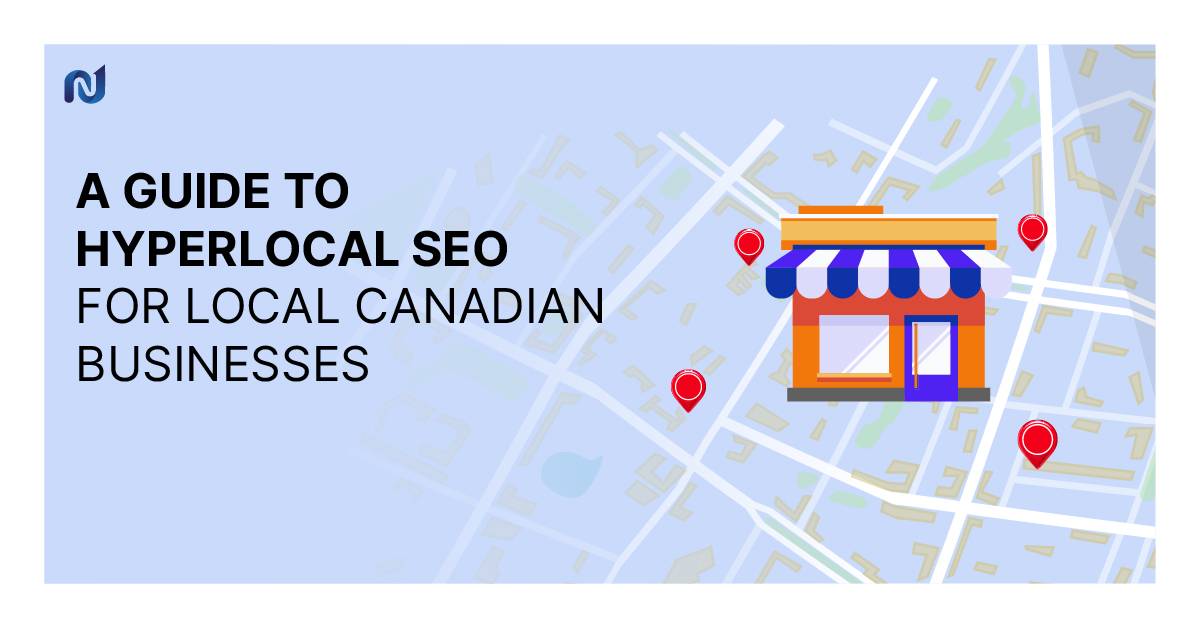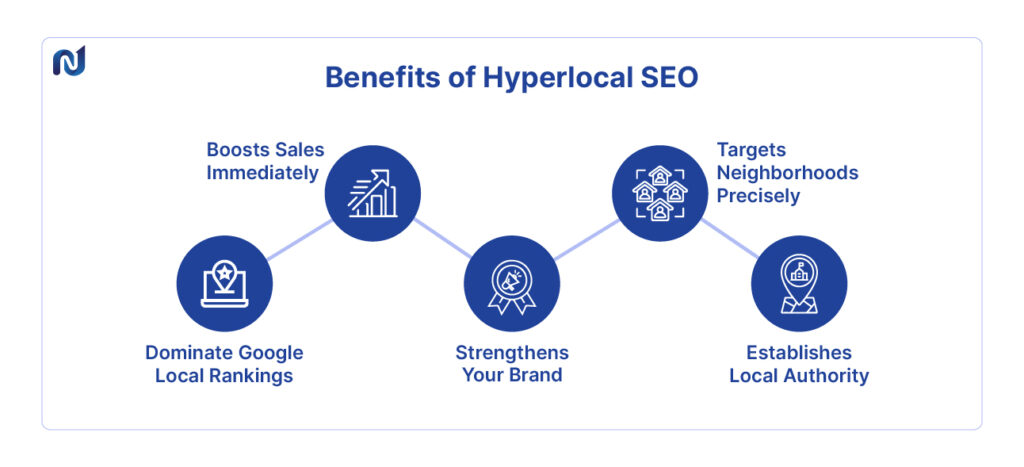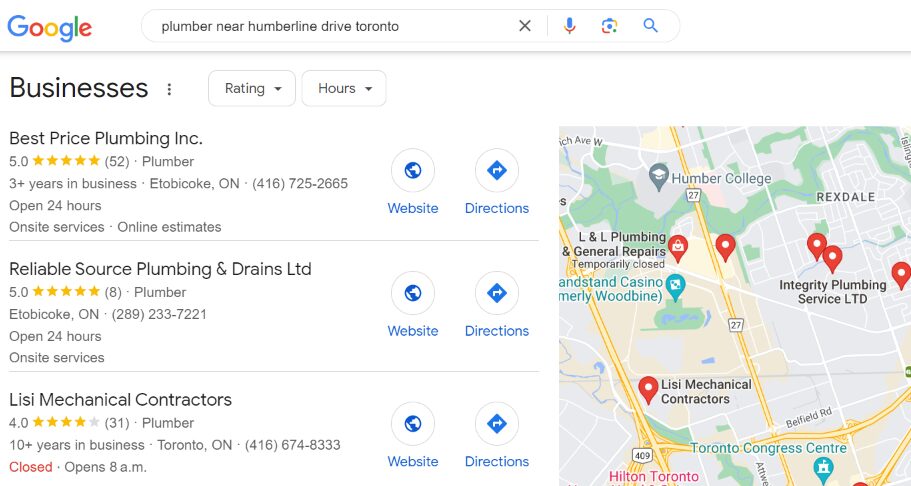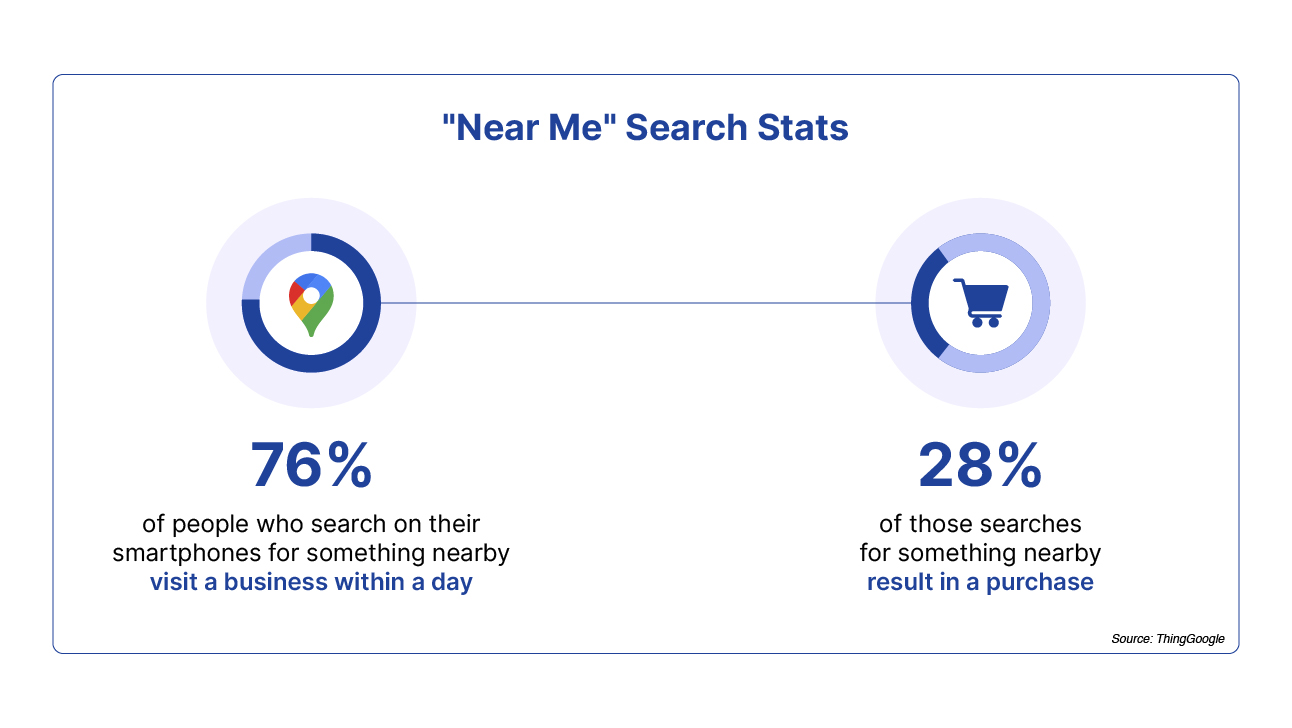
Have you ever experienced the frustration of knowing there’s a potential customer nearby who needs your services, yet remains unaware of your presence?
With Canada having some of the world’s highest internet usage rates, not being visible online is like waving goodbye to potential customers. But hey, that’s where hyperlocal SEO steps in.
We’ve created this guide to help you understand the strategies for hyperlocal SEO, making your business the neighbourhood favourite for “near me” searches.
Table of Contents
- What Is Hyperlocal SEO?
- Comparative Analysis of Traditional SEO, Local SEO, and Hyperlocal SEO
- Why Is Hyperlocal SEO Important for Local Canadian Businesses?
- Must-Do Hyperlocal SEO Strategies for Local Canadian Businesses
- Optimize Your Google Business Profile (GBP) Listing
- Mobile Optimization for Hyperlocal SEO
- Hyperlocal Keyword Research
- Crafting Hyperlocal SEO Content
- Voice Search Optimization for Hyperlocal SEO
- Schema Markup for a Local SEO Boost
- Build Local Online Citations
- Leverage Social Media for Local Engagement
- Encourage Positive Online Reviews
- Run Local PPC Campaigns
- Reap the Rewards: Own Your Local Market with Hyperlocal SEO
What Is Hyperlocal SEO?
Hyperlocal SEO positions your business as the go-to choice for customers in your immediate vicinity. Unlike traditional SEO which targets a broader region, hyperlocal focuses on a specific area like your street or neighbourhood. This ensures high visibility in “near me” or “close by” searches and increases local relevance.
Examples:
- A café in Vancouver optimizing for “best espresso near Granville Island“
- A boutique in Toronto targeting “women’s clothing near Queen Street West“
By focusing your SEO efforts on a hyperlocal level, you ensure your business isn’t just visible but the preferred choice for locals searching for what you offer.
Comparative Analysis of Traditional SEO, Local SEO, and Hyperlocal SEO
To put hyperlocal SEO into perspective, let’s compare it with traditional SEO and local SEO with examples of how it applies to Canadian local businesses:
| Aspect | Traditional SEO | Local SEO | Hyperlocal SEO |
| Target Geographic Area | National or international scale. Example: Canada-wide services. | City or region. Example: Toronto, Vancouver. | Specific neighbourhoods, streets, or localities within a city. Example: Gastown, Vancouver or Kensington Market, Toronto. |
| Target Audience | Broad audience across a wide geographic area. | Residents or businesses within a specific city or region. | People or businesses in a very specific location, such as a neighbourhood or near a landmark. |
| Goal | Broad visibility in search engine results. | To attract traffic from a specific city or region. | To attract traffic from people near the business. |
| Competition | High due to broader targeting. Example: Online retailers competing nationwide. | Moderate, varies by city. Example: Local restaurants in Toronto. | Lower, due to specific focus. Example: Cafés within Kensington Market, Toronto that are facing less competition than citywide. |
| Keyword Focus | General industry terms. Example: “best laptops 2024” | Localized keywords. Example: “best laptop repair in Toronto” | Highly specific local terms. Example: “laptop repair near Queen Street Toronto” |
| Ranking Difficulty | Can be high due to the broad scope and competition. | Lower than traditional SEO but can still be competitive. | Generally lower, due to the specific nature of targeting, but varies based on locality and market density. |
| Search Intent | Varied, including informational, transactional, and navigational. Example: Researching laptops. | Primarily transactional and navigational with local informational searches. Example: Searching for local laptop repair services in Toronto. | Strongly focused on transactional and navigational for immediate local services. Example: Looking for laptop repair available right now on Queen Street. |
| Conversion Rates | Varies widely based on industry and target market. | Typically higher than traditional SEO due to localized intent. | Often highest, as searches are made with immediate need and proximity in mind, leading to higher intent to purchase. |
| Content Strategy | Broad topics of interest. Example: “How to choose a laptop.” | Tailored to a city or region, including local events. Example: “Laptop fairs in Toronto.” | Highly localized content. Example: “Guide to laptop services on Queen Street.” |
| Google Business Profile | General presence, if applicable. | Essential for visibility; must include accurate regional information. | Crucial for success; the profile must be meticulously maintained with hyperlocal information, reviews, and posts. |
| Link Building | Backlinks from a variety of national and international sources. | Backlinks from local businesses, local news sites, and community blogs. | Primarily focuses on ultra-local backlinks, like neighbourhood associations and local community events. |
Why Is Hyperlocal SEO Important for Local Canadian Businesses?

Hyperlocal SEO helps you capitalize on “local intent” searches by optimizing your online presence for them. Here are some key benefits of hyperlocal SEO:
- Boost your ranking in local searches: Imagine being in the top 3 results on Google Maps for searches like “best plumber near Humberline Drive” or “coffee shop near me downtown Toronto.” Hyperlocal SEO helps you climb the local search rankings, making you more visible. This means when people search for what you offer, they’ll see your business right away, making you the top choice.

- Increase sales and conversions: When someone searches for “[service] near me,” it usually means they’re ready to buy and want something convenient nearby. By optimizing your online presence for these searches, you become the first answer they see. This can lead to more customers visiting your store or buying from you online.

- Build a strong local brand: A strong online presence that reflects your local area can do more than just improve your search ranking—it can build your brand. Hyperlocal SEO shows you’re a trusted local business and part of the community. It’s like a digital handshake with your neighbours, introducing them to your brand values and why you’re the best choice before they even visit you.
- Target specific neighbourhoods: Canada is a big country with different needs in different places. What works in Montreal might not work in Victoria. For hyperlocal targeting, research local slang, landmarks, and neighbourhood nicknames. Target “Kits Beach yoga studio” instead of just “Vancouver yoga studio” or “Kitsilano Beach yoga studio” for better local resonance.
- Become a Local Authority: Hyperlocal SEO elevates your business from a mere map listing to a trusted neighbour and local leader. This strategic approach is crucial for thriving in Canada’s competitive market.
Must-Do Hyperlocal SEO Strategies for Local Canadian Businesses
Let’s explore the essential hyperlocal SEO strategies to ensure your local Canadian business isn’t just participating in the digital economy but thriving in it.
Optimize Your Google Business Profile (GBP) Listing
By having a Google Business Profile, your business will show up on Google search results and maps, which can lead to increased traffic and ultimately more customers.
- Claim and Verify: Start by claiming and verifying your business on Google Business Profile.
- Complete Every Detail: Fill in every section accurately, from hours of operation to services offered, including hyperlocal keywords like the neighbourhoods you serve.
- Add High-Quality Photos: Include geotagged inside and outside photos of your business and team, and regularly update them. Also, upload photos of your services and products.
- Gather Reviews: Encourage satisfied customers to leave positive reviews and respond thoughtfully to each one.
- Choose Relevant Categories: Select the most relevant categories for your business to help local searchers find you.
- Engage with Local Posts: Regularly share business updates, promotions, and events through Google Posts to keep your local audience informed.
Pro Tip: How to Geotag Your Photos
Most smartphones automatically geotag photos when you take them. If you’re unsure, check your camera settings and enable “Location Services” or “Geotag Photos.” You can also manually geotag photos after they’re taken using various photo editing or online tools like geotagseo.com
Mobile Optimization for Hyperlocal SEO
In today’s mobile-first world, a mobile-friendly website is non-negotiable Here’s why:
- Mobile Search Dominance: 64% of searches are from mobile devices. Without a mobile-friendly site, you’re invisible to most local customers searching for businesses like yours.
- Local Search Ranking Boost: Google favours mobile-friendly sites in local search results. Having a responsive website that provides a smooth user experience on mobile devices can boost your local search ranking.
Key Mobile Optimization Elements
- Responsive design for all screen sizes
- Fast loading speeds under 3 seconds
- Click-to-call functionality,
- Clear location visibility
- Mobile-friendly content structure
- Large tappable buttons for easy navigation.
Hyperlocal Keyword Research: Uncovering the Language of Local Customers
While traditional keyword research tools like Google Keyword Planner are great for understanding broader search trends, they might not be the most decisive solution for uncovering the true language of local customers.
Hyperlocal keywords often target a specific neighbourhood or area, resulting in lower overall search volume compared to generic terms. However, these searches represent users with high purchase intent who are likely close to your business, making them incredibly valuable.
Alternative Methods to Discover Hyperlocal Keywords
- Google Autocomplete: Start typing relevant keywords and see what suggestions Google populates. This can reveal hyperlocal variations people use in searches (e.g., typing “pizza” might suggest “best deep-dish pizza in [Neighbourhood name]”).
- Local Online Communities: Join Facebook groups, forums, or online message boards relevant to your area and industry. See how people talk about the services you offer. What specific terms do they use to describe their needs? (e.g., “Need a reliable plumber in [Neighbourhood name] to fix a leaky faucet”).
- Competitor Analysis: Look at local competitors’ websites and social media presence. What keywords are they targeting? Are there any hyperlocal terms they’ve identified that you can incorporate into your strategy?
- Directly Ask Customers: Talk to existing customers and ask them how they would search for your business online. This can be a goldmine for uncovering hyperlocal keywords that you might not have considered otherwise. (e.g., “When searching for a [your industry], what terms would you use?”)
Expand Your Local Keywords
- Include “[Industry] + [Neighbourhood name]” (e.g., “dry cleaners in The Beaches”)
- Use “[Industry] near [Landmark name]” (e.g., “coffee shop near Central Park”)
- Consider “[Service] for [Zip Code]” (e.g., “plumber servicing 90210”)
Long-Tail Keywords
Don’t forget long-tail keywords! These even more specific searches can be incredibly effective for hyperlocal SEO. For example, “best place to get gluten-free cupcakes in [Neighbourhood name]”.
Crafting Hyperlocal SEO Content
Creating content that resonates with your hyperlocal audience is key to engaging potential customers. Here’s how to craft content that hits home:
- Highlight Local Events and News: Write blog posts, social media updates, or landing pages dedicated to local happenings relevant to your business and audience. This not only boosts SEO but also shows your investment in the community.
- Showcase Customer Stories: Share testimonials or stories from local customers. This personal touch can make your business more relatable and trustworthy to people in your area.
- Use Local Language and Slang: If your community has unique phrases or slang, incorporating them into your content can make your business feel more familiar and embedded in the local culture.
- Feature Local Landmarks or Popular Spots: Mentioning well-known local landmarks or favourite local spots in your content can help improve local search relevance and forge a stronger connection with your audience.
- Create Location-Specific Pages: If your business serves multiple neighbourhoods or locations, consider creating separate pages on your website for each area. Tailor the content on these pages to reflect the specific services, offers, or events relevant to each location.
Voice Search Optimization for Hyperlocal SEO
The rise of voice assistants makes voice search optimization crucial for hyperlocal SEO. Here’s how to optimize your presence for spoken queries:
- Conversational Content: Craft website content that answers questions users might ask with voice search. For instance, a bakery might target “closest bakery open now” by highlighting opening hours and “fresh pastries daily” on their homepage.
- Natural Language Keywords: Integrate natural language phrases mirroring spoken conversations. A window cleaning service could target “best window cleaning services in [city]” throughout its website.
- Quick Answer Optimization: Structure content to deliver fast answers. A pet store might have a prominent FAQ section listing “pet-friendly cafes” near its location.
- Conversational Clarity: Keep answers short and direct, replicating a conversation. A bookstore could target “quiet reading cafes” with a blog post listing nearby cafes (including theirs if relevant).
- Seasonal & Local Focus: Create content aligned with local interests. A sporting goods store could target “fall activities for families” with a curated list of nearby hiking trails.
- Hyperlocal Activity Integration: Align content with local activities. A dentist could write a blog post about “kid-friendly restaurants near me” to appear in searches for family dining options.
Schema Markup for a Local SEO Boost
Improve your local SEO with schema markup, which is coding that helps search engines understand your business. Schema markup gives search engines more info, making it easier for customers to find you. Remember: accurate and consistent information is key!
- Local Business Schema: Add your name, address, phone number, and hours. This helps you appear in local searches and voice queries.
- Product/Service Schema: Highlight what you offer to show up in relevant searches.
- Reviews Schema: Display ratings and reviews to build trust and clicks.
Build Local Online Citations
Ensure your business is listed in local online directories and citation sites. Prioritize accuracy and consistency in your NAP (Name, Address, Phone Number) information across all listings.
Top Directories for Canadian Businesses:
- Yelp.ca
- Yellow Pages Canada
- CanadaOne
- 411.ca
Leverage Social Media for Local Engagement
Use social media platforms to connect with your local community. Share local news, participate in local events, and use location-based hashtags to increase visibility.
Encourage Positive Online Reviews
Positive reviews boost your reputation and search rankings. Encourage reviews by asking customers directly, providing easy links, and responding to all reviews, both positive and negative.
Run Local PPC Campaigns
Complement your SEO efforts with PPC campaigns targeting local keywords. This can provide immediate visibility while your organic efforts gain momentum.
Pro Tip for Google Ads
Use Google Ads’ location targeting to show your ads to users in specific geographic areas, ensuring you’re reaching the most relevant audience.
Reap the Rewards: Own Your Local Market with Hyperlocal SEO
By implementing these strategies, you’re not just ensuring your business is seen—you’re becoming a trusted neighbour, a remembered name, and the go-to choice. Reap the rewards of hyperlocal SEO and watch your local business flourish.
Ready to unlock the hyperlocal SEO advantage? Numero Uno Web Solutions is here to guide you. Our expert team crafts customized strategies to supercharge your local search visibility, fuel customer foot traffic, and forge strong bonds within your community. Contact us today and let’s map out your journey to local market dominance.




